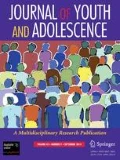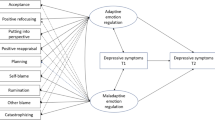Abstract
Thwarted belongingness is an established predictor of suicide ideation. Emerging theory suggests belongingness may be a crucial pathway through which risk factors such as dysfunctional emotion regulation influence suicide ideation. This study examined whether belongingness mediated the relationship between emotion regulation and suicide ideation in young people (16–25 years). Participants (n = 1699; 63.6% females, M = 20.24 years, SD = 2.45 years) completed measures of these constructs, including the emotion regulation domains of internal-functional, internal-dysfunctional, external-functional, and external-dysfunctional. Belongingness mediated over half of the association between three emotion regulation domains and suicide ideation (internal-functional: 55.6%, internal-dysfunctional: 54.1%, and external-functional: 64.8%). Consistent with current etiological suicidality models, results suggest low belongingness is an important precursor to suicide ideation in young people, and that there is an inter-relationship between emotional regulation styles and belongingness.

Similar content being viewed by others
References
Anestis, M. D., Bagge, C. L., Tull, M. T., & Joiner, T. E. (2011). Clarifying the role of emotion dysregulation in the interpersonal-psychological theory of suicidal behavior in an undergraduate sample. Journal of Psychiatric Research, 45(5), 603–611. https://doi.org/10.1016/j.jpsychires.2010.10.013.
Baumeister, R. F., & Leary, M. R. (1995). The need to belong: desire for interpersonal attachments as a fundamental human motivation. Psychological Bulletin, 117, 497–529.
Beck, A. T., & Steer, R. A. (1991). Manual for the Beck scale for suicide ideation. San Antonio, TX: Psychological Corporation.
Brausch, A. M., & Decker, K. (2014). Self-esteem and social support as moderators of depression, body image, and disordered eating for suicidal ideation in adolescents. Journal of Abnormal Child Psychology, 42, 779–789. https://doi.org/10.1007/s10802-013-9822-0.
Brumariu, L. E. (2015). Parent–child attachment and emotion regulation. New Directions for Child and Adolescent Development, 2015(148), 31–45. https://doi.org/10.1002/cad.20098.
Bryan, C. J., Rozek, D. C., Butner, J., & Rudd, M. D. (2019). Patterns of change in suicide ideation signal the recurrence of suicide attempts among high-risk psychiatric outpatients. Behaviour Research and Therapy, 120, 103392. https://doi.org/10.1016/j.brat.2019.04.001.
Cheung, E. O., & Gardner, W. L. (2015). The way I make you feel: Social exclusion enhances the ability to manage others’ emotions. Journal of Experimental Social Psychology, 60, 59–75. https://doi.org/10.1016/j.jesp.2015.05.003.
Chu, C., Walker, K. L., Stanley, I. H., Hirsch, J. K., Greenberg, J. H., Rudd, M. D., & Joiner, T. E. (2018). Perceived problem-solving deficits and suicidal ideation: evidence for the explanatory roles of thwarted belongingness and perceived burdensomeness in five samples. Journal of Personality and Social Psychology, 115(1), 137. https://doi.org/10.1037/pspp0000152.
Cockshaw, W. D., Shochet, I. M., & Obst, P. L. (2013). General belongingness, workplace belongingness, and depressive symptoms. Journal of Community & Applied Social Psychology, 23(3), 240–251. https://doi.org/10.1002/casp.2121.
Cockshaw, W. D., Shochet, I. M., & Obst, P. L. (2014). Depression and belongingness in general and workplace contexts: a cross-lagged longitudinal investigation. Journal of Social and Clinical Psychology, 33(5), 448–462. https://doi.org/10.1521/jscp.2014.33.5.448.
Fisher, L. B., Overholser, J. C., Ridley, J., Braden, A., & Rosoff, C. (2015). From the outside looking in: sense of belonging, depression, and suicide risk. Psychiatry, 78(1), 29–41. https://doi.org/10.1080/00332747.2015.1015867.
Gratz, K. L., & Roemer, L. (2004). Multidimensional assessment of emotion regulation and dysregulation: Development, factor structure, and initial validation of the difficulties in emotion regulation scale. Journal of Psychopathology and Behavioral Assessment, 26(1), 41–54. https://doi.org/10.1023/B:JOBA.0000007455.08539.94.
Gratz, K. L., Spitzen, T. L., & Tull, M. T. (2020). Expanding our understanding of the relationship between nonsuicidal self-injury and suicide attempts: The roles of emotion regulation self‐efficacy and the acquired capability for suicide. Journal of Clinical Psychology. https://doi.org/10.1002/jclp.22950.
Hagerty, B. M., & Patusky, K. (1995). Developing a measure of sense of belonging. Nursing Research, 44(1), 9–13. https://doi.org/10.1097/00006199-199501000-00003.
Hatcher, S., & Stubbersfield, O. (2013). Sense of belonging and suicide: a systematic review. The Canadian Journal of Psychiatry, 58(7), 432–436. https://doi.org/10.1177/070674371305800709.
Joiner, T. E. (2005). Why people die by suicide. Cambridge, MA: Harvard University Press.
Klonsky, E. D., & May, A. M. (2015). The three-step theory (3ST): a new theory of suicide rooted in the “ideation-to-action” framework. International Journal of Cognitive Therapy, 8(2), 114–129. https://doi.org/10.1521/ijct.2015.8.2.114.
Kullik, A., & Petermann, F. (2013). Attachment to parents and peers as a risk factor for adolescent depressive disorders: the mediating role of emotion regulation. Child Psychiatry & Human Development, 44(4), 537–548. https://doi.org/10.1007/s10578-012-0347-5.
Macalli, M., Tournier, M., Galéra, C., Montagni, I., Soumare, A., Côté, S. M., & Tzourio, C. (2018). Perceived parental support in childhood and adolescence and suicidal ideation in young adults: a cross-sectional analysis of the i-Share study. BMC Psychiatry, 18(1), 373. https://doi.org/10.1186/s12888-018-1957-7.
MacKinnon, D. P., & Dwyer, J. H. (1993). Estimating mediated effects in prevention studies. Evaluation review, 17(2), 144–158. https://doi.org/10.1177/0193841X9301700202.
Macklem, G. L. (2007). Practitioner’s guide to emotion regulation in school-aged children. Springer Science & Business Media.
McClelland, H., Evans, J. J., Nowland, R., Ferguson, E., & O’Connor, R. C. (2020). Loneliness as a predictor of suicidal ideation and behaviour: a systematic review and meta-analysis of prospective studies. Journal of Affective Disorders. https://doi.org/10.1016/j.jad.2020.05.004.
Miller, A. B., McLaughlin, K. A., Busso, D. S., Brueck, S., Peverill, M., & Sheridan, M. A. (2018). Neural correlates of emotion regulation and adolescent suicidal ideation. Biological Psychiatry: Cognitive Neuroscience and Neuroimaging, 3(2), 125–132. https://doi.org/10.1016/j.bpsc.2017.08.008.
Nock, M. K., Green, J. G., Hwang, I., McLaughlin, K. A., Sampson, N. A., Zaslavsky, A. M., & Kessler, R. C. (2013). Prevalence, correlates, and treatment of lifetime suicidal behavior among adolescents: Results from the national comorbidity survey replication adolescent supplement. JAMA Psychiatry, 70(3), 300–310. https://doi.org/10.1001/2013.jamapsychiatry.55.
O’Connor, R.C., Cleare, S., Eschle, S., Wetherall, K., & Kirtley, O.J. (2016). The integrated motivational‐ volitional model of suicidal behavior: an update. The International Handbook of Suicide Prevention, 220–240. https://doi.org/10.1002/9781118903223.ch13.
Ong, E., & Thompson, C. (2018). The importance of coping and emotion regulation in the occurrence of suicidal behavior. Psychological Reports, 122(4), 1192–1210. https://doi.org/10.1170/033294118781855.
Parr, E.J., Shochet, I.M., Cockshaw, W.D., & Kelly, R.L. (2020) General belonging is a key predictor of adolescent depressive symptoms and partially mediates school belonging. School Mental Health, 1–12. https://doi.org/10.1007/s12310-020-09371-0.
Phillips, K. F. V., & Power, M. J. (2007). A new self-report measure of emotion regulation in adolescents: the regulation of emotions questionnaire. Clinical Psychology & Psychotherapy, 14(2), 145–156. https://doi.org/10.1002/cpp.523.
Prinstein, M. J., Boergers, J., Spirito, A., Little, T. D., & Grapentine, W. L. (2000). Peer functioning, family dysfunction, and psychological symptoms in a risk factor model for adolescent inpatients’ suicidal ideation severity. Journal of Clinical Child Psychology, 29(3), 392–405. https://doi.org/10.1207/S15374424JCCP2903_10.
Roeder, K. M., & Cole, D. A. (2019). Simultaneous longitudinal examination of hopelessness, thwarted belongingness, and perceived burdensomeness as predictors of suicide ideation. Suicide and Life‐Threatening Behavior, 49(4), 1058–1071. https://doi.org/10.1111/sltb.12508.
Roland, E. (2002). Bullying, depressive symptoms and suicidal thoughts. Educational research, 44(1), 55–67. https://doi.org/10.1080/00131880110107351.
Shochet, I. M., Dadds, M. R., Ham, D., & Montague, R. (2006). School connectedness is an underemphasized parameter in adolescent mental health: Results of a community prediction study. Journal of Clinical Child & Adolescent Psychology, 35(2), 170–179. https://doi.org/10.1207/s15374424jccp3502_1.
Van Orden, K. A., Cukrowicz, K. C., Witte, T. K., & Joiner, Jr, T. E. (2012). Thwarted belongingness and perceived burdensomeness: construct validity and psychometric properties of the Interpersonal Needs Questionnaire. Psychological Assessment, 24(1), 197–215. https://doi.org/10.1037/a0025358.
Wen, Z., & Fan, X. (2015). Monotonicity of effect sizes: Questioning kappa-squared as mediation effect size measure. Psychological Methods, 20(2), 193. https://doi.org/10.1037/met0000029.
World Health Organisation (2018) Suicide [Online]. Suicide. Retrieved on 9 Dec 2019 from https://www.who.int/news-room/fact-sheets/detail/suicide.
Yıldız, M. A., & Duy, B. (2019). The predictive role of emotion regulation strategies on depressive and psychosomatic symptoms in adolescents. Current Psychology, 38(2), 387–396. https://doi.org/10.1007/s12144-017-9616-6.
Young, K. S., Sandman, C. F., & Craske, M. G. (2019). Positive and negative emotion regulation in adolescence: links to anxiety and depression. Brain Sciences, 9(4), 76. https://doi.org/10.3390/brainsci9040076.
Acknowledgements
We thank the members of the original study “How well are young Australians?”, especially Prof Leanne Hides, for sharing the earlier study data for use in the current study’s data analysis. We would also like to thank Rachel Kelly for her valuable editorial and research assistance.
Funding
The authors report that this study did not receive any funding.
Data Sharing and DeclarationThis manuscript’s data will not be deposited.
Author information
Authors and Affiliations
Contributions
G.S. conceived of the study, contributed to study design, interpretations, conducted analyses, wrote the manuscript and contributed to revisions; I.S. helped conceive the study, contributed to study design, interpretations, conducted analyses, and revisions; W.C. contributed to study design, interpretations, conducted analyses, and revisions; and L.H. consulted on design and analysis, contributed to provision of data for this study, and participated in revisions. All authors read and approved the final manuscript.
Corresponding author
Ethics declarations
Conflict of Interest
The authors declare that they have no conflict of interest.
Ethical Approval
All procedures performed in studies involving human participants were in accordance with the ethical standards of the institutional and/or national research committee and with the 1964 Helsinki declaration and its later amendments or comparable ethical standards. This study was approved by the Queensland University of Technology (QUT) Human Research Ethics Committee (exemption no: 1600000943) where this study’s research procedures were carried out.
Informed Consent
Participants from the original study “How well are young Australians?” had provided written agreement for non-identifiable data to be used in future related projects.
Additional information
Publisher’s note Springer Nature remains neutral with regard to jurisdictional claims in published maps and institutional affiliations.
Rights and permissions
About this article
Cite this article
Swee, G., Shochet, I., Cockshaw, W. et al. Emotion Regulation as a Risk Factor for Suicide Ideation among Adolescents and Young Adults: The Mediating Role of Belongingness. J Youth Adolescence 49, 2265–2274 (2020). https://doi.org/10.1007/s10964-020-01301-2
Received:
Accepted:
Published:
Issue Date:
DOI: https://doi.org/10.1007/s10964-020-01301-2




